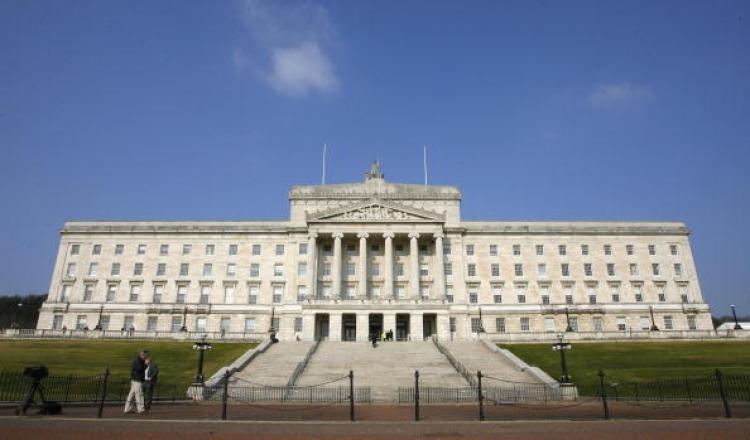Corporation Tax: Rate Cut Likely As Prime Minister David Cameron Set To Let Northern Ireland Go It Alone
Northern Ireland looks set to be handed the power to slash corporation tax in a move with the potential to significantly boost our stuttering economy.
In a development which could transform international investment, senior sources in London and Belfast predict that an announcement will be made no later than October by Prime Minister David Cameron.
Finance Minister Simon Hamilton said: “I am optimistic that we will get a positive answer from the Prime Minister.
“I think that the Government wants to do this and we have made a very robust case to them.”
A senior Tory source concurred with this assessment. However, the cost of cutting the tax is likely to be more than £200m a year.
Lowering the rate of corporation tax, a levy on business profits, is seen by the local business community and all the main parties here as a key to revitalising the economy. It could reduce reliance on public spending and raise wages in the private sector by attracting in hi-tech companies.
The Republic’s rate of 12.5%, compared to 20% here, has been crucial to attracting critical clusters of American corporations seeking overseas bases. It was the main reason companies like Google, Facebook, Apple, Microsoft and Pfizer set up shop south of the border.
A complicated US tax-avoidance scheme known as the “double Irish sandwich” has added to the attraction. It has, for instance, allowed Google to pay just 2.4% tax on its overseas earnings.
“I believe the Prime Minister is increasingly minded to make a decision to devolve this tax,” one Conservative source told the Belfast Telegraph.
Mr Hamilton said that although the issue had dropped off the political radar in recent months and there had been no publicity about it, negotiations had continued in the background. Preliminary work had already gone on drafting the necessary legislation in anticipation of the Prime Minister’s announcement.
The process has involved the Treasury in London as well as three Northern Ireland departments. They are the Department of Enterprise Trade and Investment, the Department of Finance, and the Office of the First and Deputy First Minister.
Mr Hamilton believes that “reducing corporation tax can provide the gear shift we need to move from the type of economy that we have now to one which involves more hi-tech employers, high-end manufacturing, pharmaceuticals and high-end financial services”.
The upfront cost of making the switch is considerable. Sammy Wilson, Mr Hamilton’s predecessor, has estimated that initial loss of revenue for every percentage point reduction in corporation tax would be £40m a year.
Mr Hamilton spoke in round figures, saying “the quantum for reducing it to Irish levels is £250-£320m annually.”
Northern Ireland must meet this money from our own resources because EU rules, set out in the Azores judgment, say a central government like Westminster cannot subsidise tax reductions made by a regional Assembly like Stormont.
Making cuts, or imposing new taxes to pay this cost, would put strains on Stormont. The Executive has already failed to reach agreement on meeting the cost of welfare reform and faces other reductions in its current budget as a result of cutbacks in London.
Mr Hamilton said: “You have £114m due to come out our budget next year for welfare reform penalties. You have also got about £150m of a loss as austerity cuts start to bite. So our spending is going down by about 1.6% whether we have welfare reform or not.”
He added: “Reducing corporation tax is still attractive and worthwhile but we will have to plan and budget for the initial cost.”
If Mr Cameron makes the announcement as expected, legislation would have to be completed before parliament dissolves on March 30. After that it would take another two years before the tax would actually be reduced, but in the meantime Invest NI could recruit overseas investors on the basis that the change was coming.
Background
All the Executive parties agree that power to levy corporation tax should be devolved to Northern Ireland. The business profits tax is currently charged at 20% in the UK. Local parties want to reduce it to at least match the Republic rate of 12.5%. However, under EU rules, we must meet the cost from our own budget – the tax cut cannot be subsidised by London. After nearly seven years of discussion, Prime Minister David Cameron has promised to give a decision this year.
How rates vary across Europe
- Malta 35%
- Belgium 33.99%
- France 33.33%
- Italy 31.4%
- Spain 30%
- Germany 29.58%
- Luxembourg 29.22%
- Greece 26%
- Netherlands 25%
- Austria 25%
- Denmark 24.5%
- Portugal 23%
- Slovakia 22%
- Sweden 22%
- United Kingdom 21%
- Estonia 21%
- Finland 20%
- Poland 19%
- Hungary 19%
- Czech Republic 19%
- Slovenia 17%
- Romania 16%
- Latvia 15%
- Lithuania 15%
- Cyprus 12.5%
- Ireland 12.5%
- Bulgaria 10%
Source: belfasttelegraph.co.uk




